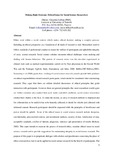| dc.description.abstract | Ethics exist within a social context, which makes ethical decision making a complex process.
Including an ethical perspective as a foundation of all kinds of research is vital. Researchers need to
follow standards of professional conduct to ensure the welfare of participants and uphold the integrity
of social science research. Social science scholars encounter ethical challenges when studying and
dealing with human behaviour. The genesis of research ethics was the atrocities experienced in
clinical trials such as medical experimentation carried out by Nazi physicians in the Second World
War and the Tuskegee Syphilis Study (Samantaray and Sahu, 2008: Babbie,2007:Robson,2002).
Samantary et al (2008) posits that a reading of social science research journals provide little guidance
on ethical responsibilities toward research participants, which should be considered when undertaking
research. They argue that there are seldom detailed discussions of ethical principles that guide
interaction with participants. However, there are general principles that most researchers would agree
on. Unlike scientists who conduct their work under controlled conditions, social science researchers
conduct their studies in the field. To study the society, an array of research methods is employed and
for collected data to be useful it has to be honestly collected, it should be reliable and collected with
informed consent. Research participants should be respected while the principles of beneficence and
justice should be upheld. Some of the ethical issues in social science research include deception,
confidentiality, preconceived notions, and recruitment methods, security of data, falsification of data,
acceptable standards, conflict of interest, plagiarism, rationale and presentation of results (Robson,
2002). This paper intends to examine the genesis of research ethics, examine ethical issues in social
science research and to provide suggestions for maintaining integrity in social science research. The
purpose of this paper is to perpetuate dialogue with scholars and practitioners concerning the place of
ethics in research so that it can be applied in social science research for the benefit of participants. The significance of this study is to enhance understanding and consideration of ethical issues in social
science research. Data will be collected through document desk review. Findings from the desk
review will inform social science researchers and equip them with knowledge to attend to risk of potential harm and consider the potential benefit of research to individuals and society and minimize risks which could be psychological, sociological, emotional, and financial and legal. | en |

